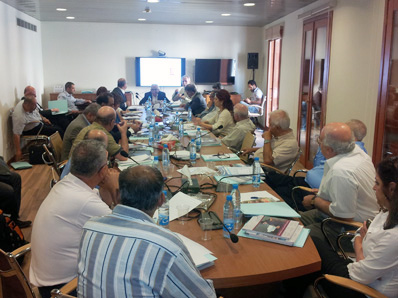
On June 24, the Beirut Office of the Arab Center for Research and Policy Studies held a press conference and symposium to publicize the results of the 2012-2013 Arab Opinion Index, an annual survey of public opinion in Arab countries. In conjunction with local partners, the ACRPS piloted its first survey in 2011 in 12 Arab states, while the second annual survey for 2012-2013 was conducted in 14 Arab countries, including Algeria, Egypt, Iraq, Jordan, Lebanon, Mauritania, Morocco, Palestine, Saudi Arabia, Sudan, Tunisia, Yemen, Kuwait and Libya, the latter two being new to the survey. The opinion poll addresses public attitudes toward economic, social, and political questions of democracy and civil participation.
Dr. Wajih Kawtharani, head of the ACRPS's Beirut branch, began the proceedings by thanking the attendants who had come to the meeting in the midst of the circumstances prevailing in Lebanon, and giving a brief description of the Center's publications, activities, and outputs. He emphasized the Center's work in translating to and from the Arabic language, as well as the Doha Historical Dictionary of the Arabic Language.
Following Kawtharani's introduction of the Center, ACRPS Researcher Dr. Mohammad Almasri, Head of the Policy Analysis Unit and Coordinator of the Arab Opinion Index, began with an explanation of the project as an annual effort to measure shifts in Arab public opinion toward a number of issues of public concern. Almasri pointed out how the 2012-2013 poll was based on answers received from 20,350 respondents who took part in face-to-face interviews with the ACRPS' local partners. He clarified how a selection of the sample was geared toward local administrative divisions within individual countries, citing Lebanon as an example where the sampling was based on the countries 25 districts or Aqdia (singular: Qada).
Discussions Following the Presentation
A number of audience members present at the meeting, including a number of experts on opinion polling, questioned, and expressed reservations about, Almasri's presentation. In response, Dr. Almasri further explained the methodology adopted by the project's team in terms of both questionnaire design and how local partners, who would implement the sampling, were selected, as well as how his team assisted and trained the ACRPS's local partners to ensure the quality of the data gathered. He discussed why samples used in individual countries varied, as well as why the survey could not be conducted in the United Arab Emirates, Bahrain, Syria, or Qatar.
While explaining the difficulties facing each individual poll, Almasri pointed out that the ACRPS's team diligently ensured that the questions were worded neutrally, particularly when it came to questions on Syria.
Responding to a remark made by Moin Haddad, Almasri accepted that the results presented at the meeting in Beirut lacked any analysis, and noted that the analysis of such results would rest with academics and the extent of their concern for the attitudes of public opinion.
Rabee al-Haber, from Statistics Lebanon and the ACRPS's local partner, explained the sampling methodology in Lebanon. According to him, the fact that, beginning in 1997, 6-10 surveys were conducted annually in Lebanon, making it possible to accumulate expertise and information on attitudes prevalent in public opinion. Over time and with experience, explained Haber, polling experts had learned the best ways to phrase questions and design samples in a country where no official census has been conducted for decades.
Finally, Almasri gave a more detailed description of the steps the project's team took to ensure that the survey met the ACRPS's high academic standards, most important was to ensure that the wording used in the questionnaire was neutral and did not turn into leading questions. He also explained the rationale behind giving the results of the survey from each country equal weight, which in the end ensured that the aggregated results painted a true picture of what could be called "Arab public opinion".